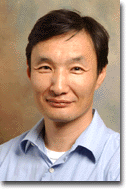| Laboratory of Immunology |
Intramural Program Investigators ^ Home ^ |
| Arya Biragyn, Ph.D., Investigator Immunotherapeutics Unit |
 Dr. Arya Biragyn (Bira Arya) received his Ph.D. from the Institute of Molecular Biology at Engelgardt, Academy of Sciences of Russia, Moscow, in 1991. He obtained postdoctoral training from the University of Illinois at Urbana from 1991-1992 and the National Cancer Institute from 1992-1996. From 1996-2000 he was a scientist at the Science International Applications Corp. in Frederick, MD, where he worked on the development of new generation therapeutic vaccines for B cell lymphomas. In 2000 he moved to the Experimental Transplantation and Immunology Branch, National Cancer Institute as a Staff Scientist, where he continued his cancer vaccine studies. In 2003 he became an Investigator in the tenure-track program at the Laboratory of Immunology, National Institute on Aging. Dr. Arya Biragyn (Bira Arya) received his Ph.D. from the Institute of Molecular Biology at Engelgardt, Academy of Sciences of Russia, Moscow, in 1991. He obtained postdoctoral training from the University of Illinois at Urbana from 1991-1992 and the National Cancer Institute from 1992-1996. From 1996-2000 he was a scientist at the Science International Applications Corp. in Frederick, MD, where he worked on the development of new generation therapeutic vaccines for B cell lymphomas. In 2000 he moved to the Experimental Transplantation and Immunology Branch, National Cancer Institute as a Staff Scientist, where he continued his cancer vaccine studies. In 2003 he became an Investigator in the tenure-track program at the Laboratory of Immunology, National Institute on Aging.Research Interests: Vaccine Development: The lab works on the development of simpler and more potent vaccines for cancer and AIDS utilizing a chemo-attractant-based antigen delivery strategy. Immune responses to vaccines can be modulated towards either humoral or cellular responses at will depending on the chemokine used. Vaccine efficacy is tested in several murine tumor models, such as MC38/Muc1 breast cancer, Ras mutant tumors, and particularly B cell malignancies 38C13, A20, BCL1 and MOPC315, the most representative models for human B cell malignancies due to their non-immunogenic or weakly immunogenic features in syngeneic mice. Furthermore, vaccine efficacy is being improved further by expressing target antigens as self-assembled particles, which display chemokine and defensin moieties on their surface to target/deliver tumor and other antigens via receptors differentially expressed on iDC and other professional APCs. Simplicity of vaccines is being achieved by utilizing naked DNA immunizations. However, delivery of DNA in vivo is further improved and simplified by using attenuated and self-distractive Listeria or other vehicles, such as mammalian DNA incorporated in empty HBsAg particles expressing chemo-attractants. |
| Cytokinesas Vaccine Adjuvants: The vaccine strategy developed in the lab also works well for other clinically relevant diseases, such as AIDS. DNA vaccines expressing weakly immunogenic Env of HIV-1 fused with pro-inflammatory chemokines generated broadly neutralizing antibodies and elicited antigen-specific systemic and mucosal immune responses. Currently, he is working to establish a strategy for development of multivalent vaccines for AIDS by using mixture of fusion proteins with various chemokines and defensins, which elicit both humoral and cellular responses to number of HIV antigens. |
| Enhancement of Antigen Presentation by Defensins: APCs, particularly immature DCs, can be activated with endogenous antimicrobial peptides, such as murine b-defensin 2. He demonstrated that murine b-defensin 2 acted via TLR-4 to up regulate expression of co-stimulatory molecules and production of inflammatory Th1 cytokines by iDCs. The work is being expanded to study molecular mechanisms and signaling pathways of b-defensin-mediated iDC activation. At present, a wide variety of human and mouse defensin-like genes have been cloned to search for functionally similar peptides, which can also be utilized for cancer vaccine studies. |
| Contact Information: Laboratory of Immunology Biomedical Research Center, room 08C220 251 Bayview Boulevard, Suite 100 Baltimore, MD 21224-6825 Phone 410-558-8680 Fax 410-558-8284 E mail biragyna@grc.nia.nih.gov For more information about the Laboratory: http://www.grc.nia.nih.gov/branches/li/li.htm |
| IRP Home What's New Contact Us Accessibility Disclaimer Privacy Site Search Site Map NIA Home |
 |
 |
 |